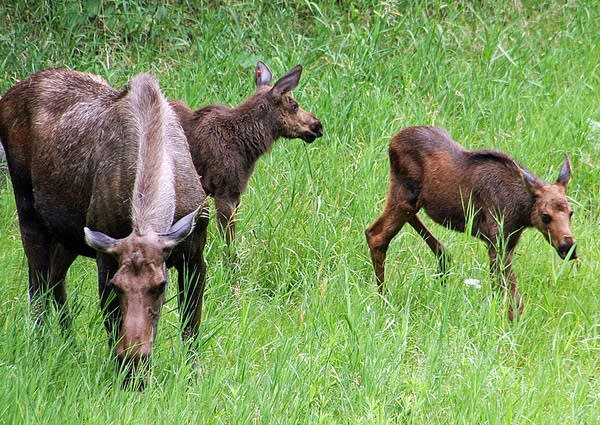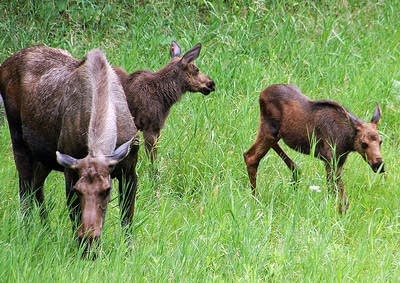Report: No change for state's moose hunt
Go Deeper.
Create an account or log in to save stories.
Like this?
Thanks for liking this story! We have added it to a list of your favorite stories.

A committee considering the plight of Minnesota's dwindling moose herd released recommendations today - calling for no change to the state's annual moose hunt, but did call for continued control of northeast Minnesota's deer herd.
The state's Moose Advisory Committee formed last September on directive of the Minnesota legislature
The committee report released in Duluth Tuesday says climate change is a long term threat to the large animals. But the panel predicts that the moose population in northeast Minnesota will likely be able to sustain itself for the foreseeable future.
Still, there are certainly signs the remaining moose are under stress.
Turn Up Your Support
MPR News helps you turn down the noise and build shared understanding. Turn up your support for this public resource and keep trusted journalism accessible to all.
Rolf Peterson, a biologist from upper Michigan, chaired the panel, which included hunters, tribal representatives, environmental groups and government agencies. Peterson said climate change is likely the leading cause of the moose herd's troubles.
Peterson said the weather has been warming, and moose just don't do well in heat.
"We wouldn't even be here today if it wasn't for climate change, so the future looks like more of the same," Peterson said.

In northwest Minnesota, there were about 4,000 moose in the early 1980s. That herd has plummeted to fewer than 100 today.
The northeast Minnesota herd remains a little more robust at about 7,000 animals, and that seems to be holding steady. But there are troubling signs that calves are dying frequently, and there's a fairly high die off each year among radio collared adults.
One of the leading suspects is an advancing deer herd, known to carry parasites deadly to moose. Peterson said the panel recommends continued aggressive deer hunt management, to keep the white tailed deer numbers in check.
"Managing deer at a low density in moose range was maybe the thing that could happen right away on the ground and might help moose right away, because deer are doing better further north," Peterson said. "They've moved way into Ontario, up into caribou country actually. So deer exist at pretty high densities now in northern Minnesota."
The panel wants to stop any recreational deer feeding in northeast Minnesota moose country.
Yet, the panel is not recommending any current cutbacks to an annual moose hunt. About 180 bull moose, on average, are taken by hunters each year, in a combined state and tribal hunt. Given the other threats to moose, the hunt isn't thought to be a serious detriment, but the panel does recommend stopping the hunt if population falls below certain levels.

The panel was divided whether moose should be treated as endangered or threatened in Minnesota, but narrowly chose not to recommend either.
The panel doesn't think the state needs to control the state's black bear or timber wolf populations - both of which can be significant predators on young moose. Peterson said that's been tried in Canada, and would be both politically and legally very difficult to pull off.
"And it means going in and pretty well wiping out wolves and being pretty tough on bears, year after year after year," he said.
The committee describes moose as a north woods icon that provides value to the tourism economy.
But members admit a lot still isn't known about why moose are dying; about climate change, or even for certain just how many moose are out there. It recommends additional monitoring and research, with funding coming from sources beyond moose hunting license fees.
The recommendations will now be taken up by the Department of Natural Resources. Wildlife and Policy Manger Mike DonCarlos said the state may not adopt all the proposals.
"Some of the questions don't have answers yet," DonCarlos said. "In other words, is DNR going to do exactly what's recommended here? That's yet to be determined. But I would say I'm generally pleased with the report. I think it hits some of the key issues, and now there's going to be some challenges is picking and choosing."
The DNR will now develop a moose management and research plan, using the committee's recommendations, along with supporting data and other public input.
Dear reader,
The trustworthy and factual news you find here at MPR News relies on the generosity of readers like you.
Your donation ensures that our journalism remains available to all, connecting communities and facilitating better conversations for everyone.
Will you make a gift today to help keep this trusted new source accessible to all?




